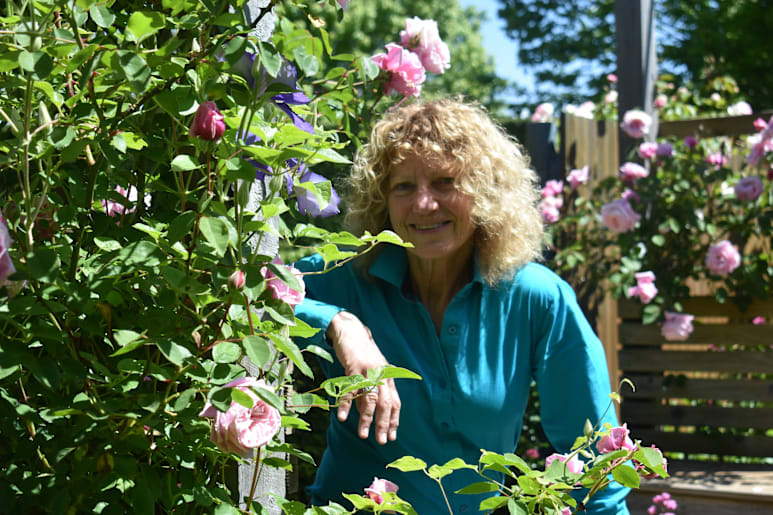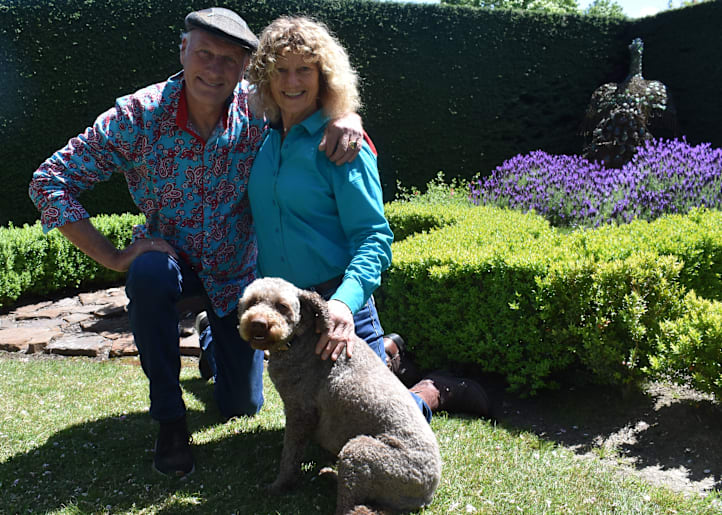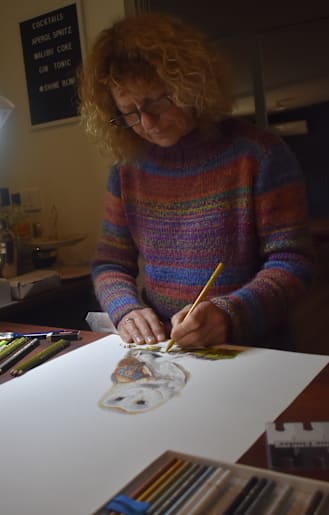IT is hard to know where to start the life story of Nicole (Nicky) Goudberg, as she has led such an interesting and at times adventurous 68 years of living.
You could even say it has been a ‘life well-travelled’.
But after a life that has seen the world’s worst tragedies, women downtrodden, murders, hangings and suffering, Nicky finally found new happiness when some six years ago she met local artist Tony Pridham.
Now living at Gough’s Bay, and enjoying life at the High Country Gardens, Gallery & Maze, Nicky has started over again with a new perspective, vigor and a refreshed outlook on life.
Apart from her love of gardening she is also enjoying her new-found creativity in art and displays her works in her Studio Cafe at the Gardens & Gallery.
Latest Stories
Nicky was born in Melbourne and, at 19 years of age, went to Townsville to attend the James Cook University studying marine biology and basically only returned home (Melbourne) again for family catch ups.
She completed not only her degree with honors but went on to gain her doctorate.
“At the time James Cook was the only university in Australia that did marine science,” Nicky explained.
“I fell in love with the tropics partly because my dad is Dutch/Indonesian.
“He was born in Yogyakarta and was a prisoner of war during WWII; in fact the whole family went through the war and only just survived the Japanese, and that’s how my parents met.”
Nicky explained that her grandfather was the chief engineer for the Dutch in Java.
“He built all the railways through Java and at the time locomotives were able to do up to 100 miles per hour on his tracks,” Nicky said.
“That was the fastest rail line in the world at that time.”
The family were due to go back to Holland when WWII broke out.
“When the Japanese started their invasion the last thing my grandfather was ordered to do was to blow up all the bridges that he had built on the rail system,” Nicky said.
“So, his life’s work was basically destroyed.”
“The family were imprisoned in separate war camps for the duration and when liberated were all in such poor condition they were sent to Australia as it was believed they would not survive the long boat trip back to Holland.
“And that’s how my mother met my father,” Nicky said.
Nicky’s father, now 96 years old, is being cared for in an aged care home.
“And is an engineer to this very day,” she said.
“My dad was always full of stories of the tropics and growing up; I was fascinated.
“Later, when I went to Townsville I became tropical as well; I absolutely love the tropics and that’s where we (herself and Tony) will be heading when we are done here [Goughs Bay],” she said.
“After I did my Honors I spent three months researching as an assistant with a Canadian research team from the University of Alberta that were studying Dugongs.
“For three months I cavorted with the dolphins at Monkey Mia, before it became a tourist attraction,” she recalled.
“The dugongs and researchers were the subject of a documentary by David Parer, filmmaker and his crew, camped a couple of sand dunes over.
“We lived in the dunes among old stone walls, the remains of 100-year-old buildings, for three months and went out diving with the dugongs detailing the first behavioural work on these creatures.
Following her marine research projects in Australia, Nicky decided to head off overseas and discover the world.
“For three years I travelled starting at Singapore and then went overland crossing the Malaysian Peninsula by public transport,” she said.
“It took me about one year to go through Asia before coming out the other end.
Nicky spent three months in India, then into Sri Lanka before returning through India to Nepal where she spent some six weeks in a small village called Tatspani during which time she hiked the mountains reaching Thorong Pan (at the Nepal/China border) but could not cross.
At Taspani she helped in the hand milling of corn to earn her board, which was in a room above animal pens.
It was from here she journeyed into Pakistan.
“By the time I got to Pakistan I was so wanting to hear some Aussie accents," she recalled.
“One of the good things was that I met the Australian Cricket team who were playing a test match.
“Travelling on local buses I heard the Aussies were in town and I thought ‘where would they basically be put up’.
“The Khyber Intercontinental is where they were staying, so I fronted up and said, “I’m an Aussie girl and would love to hear some Australian accents.”
“They invited me up and I met everyone; the whole 1979 Australian cricket team was there.
“I also met Imran Khan (Pakistan captain and former Prime Minister), and the India team and was put up in the stadium for three days of the test – it was just extraordinary as I knew nothing about cricket,” Nicky said.
“When I was walking around one hotel I noticed these guys – one was Osama Eyo, a Japanese journalist and one European, Berndt de Bruin; they were dressed in the local gear and were on their phones.
“In that time I was involved in all sorts of things that were going on.
These two were reporting their stories for NATO on the Russian Spring Offensive of 1979-80 and were investigation the war crimes reportedly going on.
“They took me across to Afghanistan, saying they needed an extra camera.
“Over two weeks these guys took me around and showed me all sorts of bad stuff – covering the Mujahadin ‘Holy Warriors’.
“I came out of all that extremely traumatized; I still try to close my mind off from all the bad I saw.
“That was the most extraordinary period of my time there,” Nicky said.
From this war zone Nicky went to another conflict zone – into Iran - that was when they were hanging people in the streets; when the Ayotallah Khomeni was going through the whole revolution thing; it all added to her being even more traumatised.
[As Nicky recalls these memories, she buried her face into her hands, shook slightly but looked up again to go on with her story, the horror memories still showing on her face].
It was at the time of the 1979 USA embassy staff being held hostage and their eventual rescue.
“I had always thought ‘wouldn’t it be interesting to go to areas of conflict and to see war at the front’,” she said.
“One of the real memories I have is sitting by a fountain in a square somewhere in Iran; and there was a woman with a strong American accent, from her US education.
“She was a local; dressed completely covered from head to toe; but had the most beautiful shoes; that was all she was allowed to show.
“She was from a wealthy family, was well educated in America where she wore mini-skirts, drank coke and spoke with an American accent, and then Khomeini came in.
“We just talked – I will never forget that woman,” Nicky said.
“I thought – ‘you poor thing’; I had no idea how they were living.”
“I was so bloody innocent, my parents were super strict, I wasn’t allowed to wear make-up, or go out to see boys, and then someone that innocent was in the middle of all this conflict."
Nicky went on to travel through Syria, Lebanon, Israel and Turkey before crossing to Europe and England.
Going through Syria and Israel Nicky faced the danger of rockets flying overhead, fixed machine guns on every soldier.
“Jordan was pretty nasty for a single female travelling by herself; I went through most of these countries with little money,” Nicky said.
“Europe travel was very quick; then I got some money together by working in England (illegally as you do back then) then kept going and spent some time in America and Canada.
“The thing that really got me when I got back home was all I wanted was security; I wanted predictability; I didn’t want any surprises and I didn’t want to take responsibility for absolutely every decision that I made.
“So, I went back to James Cook Uni and started a Phd, because I knew everyone; the gossip was the same, the people were the same, the attitudes were identical from when I left – nothing had moved on.
“I so needed that.”
Nicky had been so shaken up with what she had witnessed overseas, what she had to do to survive – on buses in India where she was groped by well-dressed Indian business men, groped in the streets – all that sort of stuff – not knowing where the next threat was coming from, she just needed normality.
“Living life like that, going through the trauma gives you a different perspective; your world will never be the same again,” Nicky said.
“For me I was 24-25 when that happened, I am now 68 and still have periods where I freak out.
“There is a part of me I have had to close off.
“I took my son to see a film and it was all about the Iranian hostage situation.
“I had to walk out; I couldn’t cope; I thought “Oh my God” it took me straight back there (Iran) and it was a part of my mind that I didn’t want to open; I was a cot case; an absolute wreck.
“I don’t talk about this stuff.
“Unless you have been there and seen it you just don’t know; helicopter gunships; napalm bombing of villages on market days; it is just – I can’t watch anything that is blood-thirsty and real,” Nicky said.
“What used to really freak me was when I was back in Townsville in particular, the Black Hawks would come overhead; I didn’t cope with that.”
Nicky moved on and applied and got a job in Cairns.
“I became a manager of National Parks.
“I used to manage the wildlife – from Torres Strait down to Cardwell and inland from Mt Isa to the edge of the continental shelf.
“That was a really good time.”
But then Nicky said they took all decision making down to Brisbane, away from the local knowledge.
“It was the seat-warmers who knew nothing about how to protect the system and they ‘f…ked’ the whole system – all the people with any knowledge, and there was a whole lot of us who had spent their lives working with flora and fauna - and some little ‘dillbrain’ down in Brisbane, was making decisions on what was going to happen with National Parks.
“The government would announce funding for National Parks but the poor buggers up in the parks would have no money to run their business; it was a nightmare.”
“I left and became an environmental consultant for a number of years and worked on some fascinating projects right across the tropics.
“I was so fortunate, the things I have seen in my career.
“Then I went through a hideous divorce.
“At the time I was a lecturer at James Cook working on the wet tropics plan; had tyres slashed along with everyone else; when the Wet Tropics World Heritage Area was declared and rainforest logging was stopped; it was a really tricky time.
“I eventually found my way to Melbourne and became a town planner because there was nothing for a rainforest ecologist to do down here and grew my town planning interest becoming accredited.
“I then got a job in the Blue Mountains; based in Katoomba – I was part of the planning team looking at the environmental impacts of having all the mountains ‘poos and wees’ going into Sydney’s drinking water; what happens during wildfires and development in the sensitive swamp areas.
“I was the environmental planner for that area and at the time the Blue Mountains was just designated as a world heritage area and its listing was threatened unless there was a rigorous environmental management plan put in place.
“It was a great job; I loved that.
“I did a lot of moving around; but I was desperate to get back north - desperate to get back to the tablelands .
“I returned to ‘my town’ Millaa Millaa famous for its waterfalls; they (towns folk) used to call me the mayor of Millaa; stayed for 10 years and the night before coming to Victoria the community held a big going away party “and I might have danced on the bar”, she confessed – along with the policeman’s wife; we all ended up skinny dipping in Millaa falls.
"Moving to Mansfield area I bought a half-finished pole house at Sawmill Settlement, finished building it and set it up as a ski lodge (as you do) and four years ago then purchased this High Country Gardens, Gallery & Maze with my new partner, Tony.
“We have since built the art studio, embellished the six acres of gardens, built a commercial quality café and now welcome lots of visitors.
“Having lived such an eventful life though I am anxious to go back yet again to where I truly belong - the Atherton Tablelands; home to Millaa Millaa - I will be back in my favourite part of the world when eventually that happens,” Nicky concluded.

















